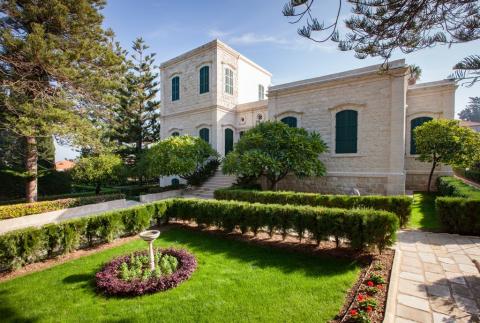After Bahá’u’lláh's confinement in the Most Great Prison in 'Akka had ended, but while He was yet residing in the town, an Egyptian merchant, ‘Abdu’l-Karim, afire with God's latest message, desired to visit Him. He wrote for permission to go on pilgrimage. He must have been greatly surprised when the reply arrived: he might go on pilgrimage but only after all his debts were paid.
He had been in business for many years. His caravans crossed the desert with precious cargo. He had quite naturally been interested in expanding his business, but now his consuming interest was to 'owe no man anything'. It followed that when he received payment, instead of investing it for further gain, he paid off a debt. This continued for five years, until at last he was debt-free.
His business shrank. No longer did 'love of wealth' consume him. When all his debts were paid, he had only enough to keep his family going in his absence and to pay for deck passage on a ship bound for Haifa. Formerly, he would have travelled first-class. Now he had neither bed nor warm stateroom. Never mind! He was going to see Bahá’u’lláh. As he crossed the gangplank, his shawl slipped into the water. The night would be chilly, but his heart was glad and he felt 'alive with prayer'.
Bahá’u’lláh informed His family that He was expecting an honoured guest. A carriage was sent to Haifa to pick up the merchant, but the attendant received no description of this very special guest. As the passengers disembarked, he watched them very carefully -- surely he would recognize someone so distinguished -- but the passengers appeared quite ordinary and in due time he returned to 'Akka with word that Bahá’u’lláh's visitor had not arrived. The merchant had expected to be met. He had no money left to hire a carriage. Bitterly disappointed, he seated himself on a bench, feeling forlorn and destitute. Bahá’u’lláh knew that His distinguished guest had arrived, even though he had not been recognized. This time He sent ‘Abdu’l-Bahá, who, in the twilight, recognized 'the disappointed figure huddled upon the bench'. Quickly the Master introduced Himself and explained what had happened. Then He asked the traveller if he would like to go to 'Akka that very night or if he would prefer to wait until morning. The merchant had already spent hours in prayer in preparation for his meeting with Bahá’u’lláh, but now he found that bitterness had seeped into his heart -- he had felt so forgotten and alone upon his arrival in Haifa. He had even begun to wonder about the very station of Bahá’u’lláh. For what had he given up his fortune? He was in spiritual torment. However, in the presence of this welcome and gentle Man, doubts and suspicions ebbed out of his soul; yet he felt the need of hours of prayer to feel spiritually ready to meet God's Emissary. As the story is told, 'Abbas Effendi knew instinctively that His new friend would not wish to seek a hotel at His expense, so finding that he preferred to wait until morning for the journey to 'Akka, 'he unbuttoned the long cloak that enveloped him, seated himself beside the pilgrim, and wrapped both on its ample folds. So they passed the night praying together, lost in that ecstasy of prayer that brings realization.'
The next morning they proceeded towards the prison-city of 'Akka. At long last the Egyptian appeared before Bahá’u’lláh with a glad heart, purified through five years of testing.
